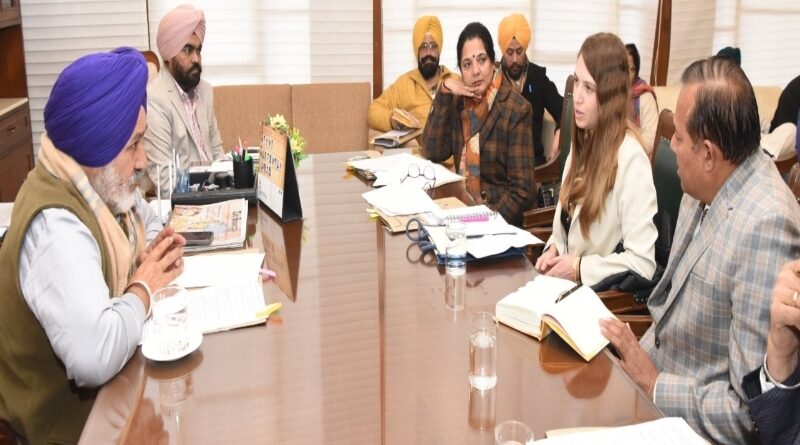Israel to provide latest technologies in horticulture sector in Punjab

Chandigarh: Punjab Horticulture Minister S. Chetan Singh Jauramajra, on Tuesday, met a high-level delegation from Israel to explore opportunities for collaboration in advancing agricultural technologies in Punjab. Building on the existing partnership in horticulture projects, the meeting emphasized the need for a digital revolution in farming.
During the meeting with Ms. Hadas Bakst, Political Domestic Advisor Embassy of Israel New Delhi, at his office here at Punjab Civil Secretariat, Cabinet Minister S. Chetan Singh Jauramajra stated that the underground water in Punjab is depleting rapidly, a critical issue that needs urgent attention. He asked the Israel delegation to provide high-yielding and disease/virus-free horticultural varieties requiring less water. The Cabinet Minister also called for providing farm-to-market technology to facilitate the marketing of all Kinnow produce in the event of a bumper crop in the state.
He highlighted key areas for collaboration, including digital solutions for pest control, climate and soil monitoring systems, AI for crop yields, decision support systems, drones for harvesting and sprays, as well as precision farming software solutions. The discussion also touched upon the potential of year-round cultivation in greenhouses and hydroponic farming to address the increasing demand for food.
The Horticulture Minister, while emphasizing the introducing high-tech agricultural machinery, harvesting machines, tree shakers, cultivators, rotary mulchers and special field robots, focused on extending to sensor technology-based irrigation systems and innovative storage solutions for efficient and sustainable farming.
Addressing the need for advancements in citrus cultivation, S. Chetan Singh Jauramajra proposed the integration of By-Product Technologies to manage bio-waste effectively. He said that on an average a single piece of Kinnow mandarin fruit contains 45-50% juice and the rest of the percentage is occupied by peel, rag and seeds, which so far of no use. So introduction of new machinery at processing units for management of bio-waste of citrus such as extraction of limonin, peel oil etc. will help a lot.
He also asked to introduce new patented citrus varieties, rootstocks resistant to pests and the cultivation of new crops like Dragon Fruit and Raspberries.
In the vegetable sector, the Minister advocated for the introduction of Parthenocarpic (seedless) varieties of melons, single-picking varieties of peas and tomatoes suitable for mechanization and brinjal varieties resistant to fruit and shoot borers. He stressed the importance of vegetables grafting with rootstock resistant to pests and diseases, as well as the development of processing varieties of vegetables, especially tomatoes.
The Cabinet Minister underlined the need for biodegradable and slow-release fertilizer technology in horticulture, along with the utilization of bio-pesticide technology to control pests and diseases. He proposed the incorporation of instant sensor-based technologies to detect nutrient deficiencies in horticultural crops.
Looking towards the future, the Minister expressed interest in adopting global trends in agricultural extension systems. Besides this, he conveyed the intention to send a delegation of 10 to 20 officers to Israel to witness firsthand the innovative technologies that could be implemented in Punjab, ultimately enhancing the livelihoods of farmers in the region.
Director Horticulture Mrs. Shailender Kaur also emphasized on integrated value chain Center of Excellence establishment in Punjab in collaboration with Israel technology to reduce Post harvest losses in horticulture crops.
Ms. Hadas Bakst said that Israel is keen to enhance technological collaboration in agriculture and horticulture sectors with the state of Punjab. She mentioned that experts level meetings will be held in February and March, which will focus on delivering the latest technology and introducing new horticultural varieties to address the state’s depleting groundwater issues. Besides this, Ms. Hadas highlighted the ongoing operation of two centers of excellence in Punjab by government of Israel, emphasizing the continued sharing of agricultural technologies.
Prominent amongst others who were present in the meeting included; Director Horticulture Mrs. Shailender Kaur, Assistant Director Horticulture Dr. Harpreet Singh, Dr. Daljit Singh and Dr. Balwinder Singh, Horticulture Development Officer Mrs. Balwinderjit Kaur and other officials.

